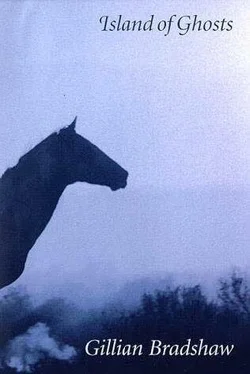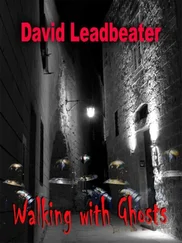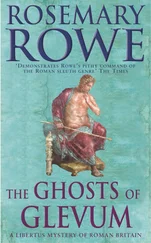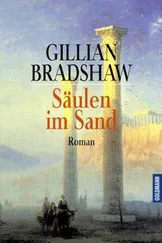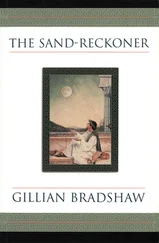Gillian Bradshaw - Island of Ghosts
Здесь есть возможность читать онлайн «Gillian Bradshaw - Island of Ghosts» весь текст электронной книги совершенно бесплатно (целиком полную версию без сокращений). В некоторых случаях можно слушать аудио, скачать через торрент в формате fb2 и присутствует краткое содержание. Жанр: Исторические приключения, на английском языке. Описание произведения, (предисловие) а так же отзывы посетителей доступны на портале библиотеки ЛибКат.
- Название:Island of Ghosts
- Автор:
- Жанр:
- Год:неизвестен
- ISBN:нет данных
- Рейтинг книги:3 / 5. Голосов: 1
-
Избранное:Добавить в избранное
- Отзывы:
-
Ваша оценка:
- 60
- 1
- 2
- 3
- 4
- 5
Island of Ghosts: краткое содержание, описание и аннотация
Предлагаем к чтению аннотацию, описание, краткое содержание или предисловие (зависит от того, что написал сам автор книги «Island of Ghosts»). Если вы не нашли необходимую информацию о книге — напишите в комментариях, мы постараемся отыскать её.
Island of Ghosts — читать онлайн бесплатно полную книгу (весь текст) целиком
Ниже представлен текст книги, разбитый по страницам. Система сохранения места последней прочитанной страницы, позволяет с удобством читать онлайн бесплатно книгу «Island of Ghosts», без необходимости каждый раз заново искать на чём Вы остановились. Поставьте закладку, и сможете в любой момент перейти на страницу, на которой закончили чтение.
Интервал:
Закладка:
Gillian Bradshaw
Island of Ghosts
I
We mutinied when we reached the ocean.
We’d been riding for fifty-one days, three companies of us with half a legion and two troops of Roman auxiliaries to guard us. We left Aquincum late in July, and rode through the heat of August: the dust and the flies were appalling. Most of the army bases where we stopped along the way didn’t have proper supplies laid up for such a large body of men, as nobody had sent messages telling them to do so; of what they did have, the Roman troops took the best for themselves, leaving us sour barley soup and coarse black bread. We weren’t used to the diet, and it made us ill. The hooves of our horses wore down on the paved Roman roads, and the beasts went lame. The Romans refused to give us leather to make horse-sandals, so we cut up the leather bindings of our wagon awnings. Then, early in September when we left the Rhine and turned west into Gaul, it began to rain, and the water ran through the loose awnings and soaked everything: bedding, food, clothes. Everything stank of wet wool, wet horses, rotting barley, and unwashed wet men, and we hated the feel of our own skins. Only our armor and weapons were safe: they had been wrapped in oilcloths at Aquincum and packed into twenty wagons of their own, which the Romans took charge of.
Then one afternoon, just before the middle of September, we were starting down from the hills when we saw it: the ocean. It had rained all that morning, but the rain had stopped about midday, and now the sky was clearing. The clouds parted and let down a watery light westward beyond us, and we looked up and saw a huge gray plain turn suddenly and impossibly blue. We had never seen the sea. We reined in our horses and stopped in the road, staring at it. The sun shimmered on the waves as far out as our eyes could see: no shadow of land darkened even the farthest limit of the horizon.
“It’s the end of the world!” whispered Arshak.
Gatalas gave a long wail of grief and dismay and covered his face. The sound rose up above the clatter and rumble of the troops behind us and before us, and when it stopped, there was complete silence. Then there was a rustling whisper-“What is it?” “The sea, we’ve reached the sea”-running back down the line. A few dozen men and horses trotted forward, leaving the road and fanning out across the hill. Then there was silence again.
Marcus Flavius Facilis, the senior centurion in charge of us, came galloping up from some discussion with his subordinates. He was a stocky, bull-necked man, white-haired, with a face that went crimson when he was angry. It was beginning to go crimson now. “What’s the matter with you bastards now?” he demanded, in Latin. He always spoke to us in his own language, though few of the officers and even fewer of the men understood it. During the long journey he had not bothered to learn Sarmatian even enough to give us orders.
Arshak, who did understand it, pointed at the sea. Gatalas didn’t even look at him, but sat with his hands over his face, rocking back and forth in his saddle.
Facilis only glanced at the sea. His eyes slid lightly away from that shining vision of blue and silver, and fixed instead on the city down the hill from us, a comfortable huddle of red tile and gray thatch. He sat back in his saddle with a grunt of satisfaction. “Bononia!” he exclaimed, almost cheerfully. “Bononia at last! That’s where we’ll be staying tonight. And tomorrow I can say good-bye to the whole stinking lot of you. Come on, you bastards: hurry up and you’ll sleep in dry beds tonight.”
“And tomorrow?” asked Arshak, very quietly. “Where will we sleep tomorrow?”
“That depends how long it takes to embark you all,” replied Facilis. “I imagine it will take a few days to ferry all of you across.”
“They said there was an island,” said Arshak, still very quietly. “They said that we would be sent to an island called Britain, and there we would have our weapons back, and be accepted as soldiers of the Romans, and receive honorable appointments and payment for our service. That is what the emperor himself swore to us at Aquincum.”
“Yes,” agreed Facilis, “and the sooner you get down this hill-”
“There is no island,” said Arshak.
“May I perish!” said Facilis, going red again. “What the hell do you mean?”
Gatalas took his hands away from his face. “There is nothing there!” he screamed. “Nothing! Nothing but ocean!” He turned his head away from that terrible immensity.
“You pigheaded barbarians!” shouted Facilis. “You stinking idiots! Of course there’s an island. It’s across there”-he waved his hand at the sea-“about thirty miles off.”
Arshak shook his head. “No,” he said, “no. You lie to us, Roman. You lied to us all along. You, the emperor, all of you. You lie. There is no island.”
Facilis’ face was growing steadily redder. “You stupid bastard! By every god on earth or under it! Why would I march a troop of lunatic Sarmatians all the way from Aquincum to Bononia if there wasn’t anywhere to send them when we got there? I wouldn’t do it for the love of barbarian company, I can promise you that!”
“You would do it to cause our deaths,” replied Arshak, still very quietly. He never raised his voice when he was angry, never swore, and never boasted. He was a member of the royal clan, second son of the king’s own brother, and he had been taught that a nobleman answers insults only with his spear. It was lucky that the spear was stowed away in the weapons wagons, with Facilis’ men guarding it. Otherwise Facilis would have been dead several times over, and Arshak as well, executed for murdering a Roman officer.
Facilis glared at him. He wiped his hands down the sides of his tunic. “The emperor wants you alive,” he declared. “He wants you in his army. He swore to give you honorable posts, and you swore to serve him faithfully. Do you mean to break your oaths now, just because you’ve seen the sea?”
“The emperor wanted to kill our whole nation,” Arshak returned. “He lied to us.”
“If we go there,” said Gatalas, jabbing a hand fearfully toward the sea, “we will die in the water.”
“No!” Facilis insisted. He did not bother to deny that the emperor had wanted to exterminate our whole nation-everyone knew that was true-but he returned instead to his first point. “There is an island there.”
We all stared at him.
“There’s a huge island there, you stupid bastards! There’s a whole Roman province, with cities and roads and three legions and the gods know how many troops of auxiliaries! The ocean’s bigger than the gods-hated Danube, you idiots: you can’t expect to see clear across it!”
Arshak glanced up the hill behind us. Behind a handful of our officers, Facilis’ legionaries waited, leaning on their javelins and watching us. Two full cohorts of them, sixteen hundred men, drawn up six abreast: their ranks stretched up the road out of sight. The rest of our men were behind them, and the wagons with the weapons were still farther away, with the baggage. Of the two troops of Roman auxiliary cavalry, one was strung out down the road before us, waiting, and the other was guarding the baggage.
Arshak looked back at Facilis and smiled. Then, saying nothing, he touched his horse and started down the hill again, and the rest of us followed him in silence. Facilis sat still on his own horse, swearing as we rode past.
“We will not go on their ships,” said Gatalas, in Sarmatian, when we were well ahead of him.
“Of course not,” replied Arshak. “It’s a trick. We’d be helpless on a ship, with our horses packed in a hold like sheep, and our weapons left onshore. They wouldn’t even need to use swords on us. A few good swimmers could take us out, sink us and the vessel, and escape themselves without the least danger.”
Читать дальшеИнтервал:
Закладка:
Похожие книги на «Island of Ghosts»
Представляем Вашему вниманию похожие книги на «Island of Ghosts» списком для выбора. Мы отобрали схожую по названию и смыслу литературу в надежде предоставить читателям больше вариантов отыскать новые, интересные, ещё непрочитанные произведения.
Обсуждение, отзывы о книге «Island of Ghosts» и просто собственные мнения читателей. Оставьте ваши комментарии, напишите, что Вы думаете о произведении, его смысле или главных героях. Укажите что конкретно понравилось, а что нет, и почему Вы так считаете.
